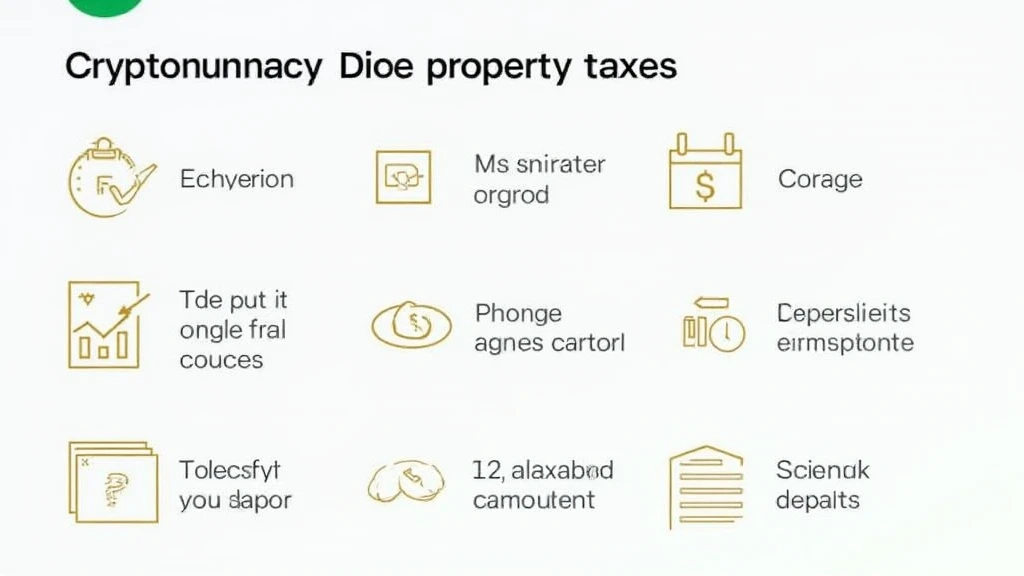How to Handle Crypto Property Taxes: A Comprehensive Guide
As the world of digital assets continues to expand, understanding how to handle crypto property taxes becomes increasingly important. With reported losses in DeFi hacks reaching over $4.1 billion in 2024, and an increasing number of investors engaging in crypto trading, navigating taxes is no longer an option but a necessity. In this comprehensive guide, we’ll break down everything you need to know about managing your crypto property taxes, ensuring compliance, and maximizing your financial health.
Understanding the Basics of Crypto Property Taxes
Just like traditional assets, cryptocurrencies are subject to taxation in many countries. The fundamental principles governing these taxes can differ significantly depending on local laws and regulations. However, there are some universal concepts that every crypto investor should understand.
- Taxable Events: Any transaction where you realize a gain or loss, such as selling, trading, or spending crypto, is generally a taxable event.
- Capital Gains Tax: Profits made from selling crypto after holding it for more than a year may be taxed as long-term capital gains, often at lower rates.
- Record Keeping: Keeping detailed records of all transactions is essential for accurately calculating your tax obligations.
Local Regulations and Compliance
In Vietnam, the rapid growth of cryptocurrency adoption has sparked discussions around tax regulations. According to recent market data, Vietnam’s user growth rate in crypto adoption has increased dramatically, leading to tighter scrutiny from tax authorities. As of 2025, it’s crucial to stay aligned with local taxation laws that may classify cryptocurrencies as assets and impose taxes accordingly.

The Vietnamese government has expressed intentions to regulate cryptocurrencies, which may include guidelines on tax obligations for crypto investors. Understanding these regulations is vital to avoid potential legal pitfalls.
Calculating Your Crypto Property Taxes
Calculating crypto property taxes involves several steps. Here’s how you can approach it:
- Determine the Cost Basis: This is essentially what you paid for the cryptocurrency, including transaction fees. For example, if you bought 1 BTC for $8,000 and later sold it for $12,000, your gain would be $4,000.
- Identify Taxable Events: Track each transaction, noting the date, amount, and the price at which you bought and sold the assets.
- Calculate Gains and Losses: For each taxable event, subtract the cost basis from the selling price to determine your capital gain or loss.
Tips for Managing Your Crypto Taxes
When dealing with crypto property taxes, here are some practical tips:
- Use Reliable Tax Software: Consider using tax software designed for cryptocurrencies, such as CoinTracking or Koinly, to ease the process.
- Engage Tax Professionals: Consulting with a tax expert knowledgeable about cryptocurrency can help you identify potential deductions and ensure compliance.
- Stay Informed: Keep up with regulatory changes both locally in Vietnam and globally, as the landscape is continuously evolving.
Frequently Asked Questions (FAQs)
1. Do I need to pay taxes on crypto received as a gift?
Yes, if you receive cryptocurrency as a gift, the fair market value at the time of receipt can be considered your cost basis for future sales.
2. Are staking rewards taxable?
Typically, staking rewards are considered taxable income in the year they are received.
3. Can I deduct losses?
Yes, losses on cryptocurrency transactions may offset gains in taxable events, potentially lowering your overall tax obligation.
Conclusion
Handling crypto property taxes may seem daunting, but with adequate knowledge and preparation, you can navigate this landscape effectively. Ensure you adhere to local regulations, maintain detailed records, and enlist professional help when necessary. As you continue to engage with the exciting world of cryptocurrency, remember that proper tax management is essential for long-term success.
For more insights on handling your crypto taxes, check out our detailed tax guide on crypto investments.
For local users, ‘tiêu chuẩn an ninh blockchain’ is essential in understanding the regulations surrounding digital assets in Vietnam.
Stay informed and compliant with tax obligations—your financial future depends on it.
Author: Dr. John Smith, a finance expert with over 20 published papers on cryptocurrency regulations and compliance, and the lead auditor on multiple high-profile blockchain projects.



